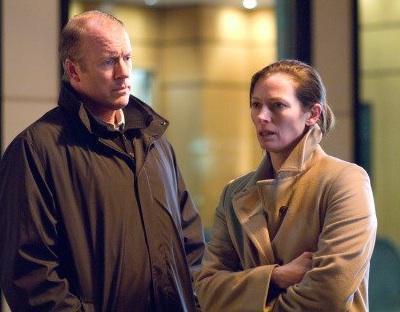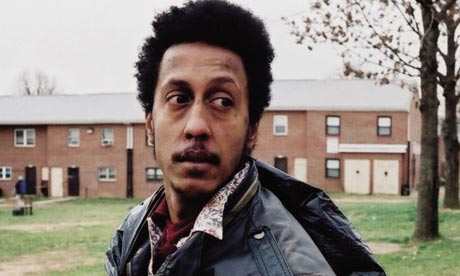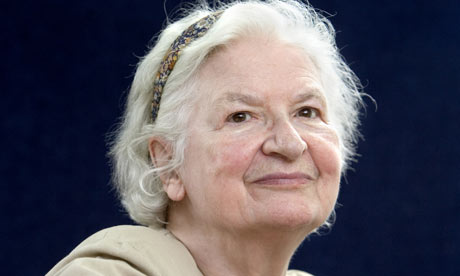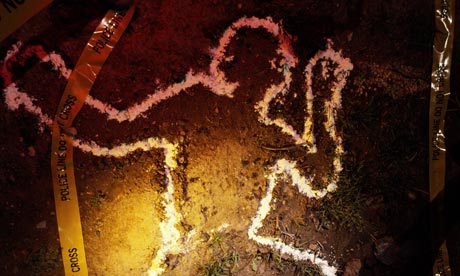I don't find that terribly surprising, even less surprising that Christians - pacifist or not - would be attracted to crime fiction, and I don't mean the "cozies," a la Murder, She Wrote (nothing wrong with cozies, mind you), that play down the grittiest and darkest human motivations and behaviors.


It's just passing Easter, and our Christian story is not about bunnies and eggs, but about political intrigue, conspiracy, human weakness, and finally the tortuous execution of an innocent man. There is a plot twist at the end.
But it might be counter-intuitive for non-Christians who cling to a caricature of Christians as sheltered, petit bourgeois prudes who compulsively seek after respectability.
I read somewhere that Stanley Hauerwas, a very well-known Christian pacifist, is also a fan of "realistic" crime fiction. In my short exchange with my Facebook friend, I admitted that I hadn't given a great deal of thought to my own affinity for it - whether novels, television series, or films. So by blogging about it, I can explore this topic in a little more depth, and maybe even invite other devotees to join the conversation.
I'm not fussy about the genre. I love P. D. James, Elmore Leonard, Val McDermid, Walter Mosley, Laura Lippman, Michael Connelly, Ian Rankin, Scott Turow, Denise Mina, Karin Slaughter, James Lee Burke, the series The Wire, films like Witness and Michael Clayton, and a whole list of other stuff. I like a good police procedural, a detective story, a legal thriller, a first-person criminal protagonist, hard noir, no matter, as long as it is well-written.

But back to the question, why? And moreover, as someone who has been won over to the foolishness of First Corinthians, why degradation, crime... murder!?
Asked a similar question, Christian crime novelist James Scott Bell replied, using a Raymond Chandler quote: "Down these mean streets a man must go who is not himself mean, who is not tarnished or afraid."
It's a snappy quote, a little heavy on the machismo as an explanation, but it speaks to a moral dimension of Christianity - living in a fallen world without being consumed by it. But I have to admit I like my characters pretty damn tarnished and afraid. I know I am, tarnished and afraid, so perhaps I need them brought low enough for my own imagination to reach.
While the Gospels have a happy ending, happy endings in a juicy noir story are an oxymoron; and in good crime fiction generally - speaking for myself - happy endings need to be satisfying in certain local resolution only, with all the worldly conflict and ambiguity intact.
What a good crime story can't avoid, in my opinion, is the tension between cultural formation and so-called free will. This inevitably implies moral engagement - even if the author is wise enough and deft enough to avoid writing editorials - and it inevitably criticizes the structures and norms of societies. A sociobiologist would make a pretty shitty crime fiction author.

There are big philosophical questions raised in a good crime story, beginning with questions about law and about crime itself. Every good tale has conflict, or we might as well be reading a recipe for lemon oatmeal cookies. Moral conflict, at the end of the day, is the only kind that matters.
Even formulaic stories - be they P. D. James with her cast of suspects that all have good motives, or LA noir like Chinatown, LA Confidential, or the Easy Rawlins series - have class, race, and political corruption as part of the setting. I actually like formulae, in the same way that I enjoy sonnets. The rules paradoxically give the writer more freedom to concentrate on content. On that count, long live the cozies!
My Facebook friend suggested the question of intent as one of the attractants of crime fiction; and that brought Elizabeth Anscombe to mind - the Catholic philosopher who was a student and then protege of Ludwig Wittgenstein. Her defining work was a monograph entitled Intention.
Interesting that intent is essential in determinations of culpability in criminal law, and that in the real world it becomes slippery precisely because the individual in the dock for a crime can never be divorced from his or her history, family, upbringing, emergencies, and dependencies; and that intent itself can disappear into the psyche, dissolving into mirror neurons and object-relations and the mystery of consciousness in the same way that matter and energy as we think we experience them can dissolve into the simultaneity of wave and particle.
There is more than a superficial reason to call a genre mystery.
Intention appears in so many guises. I am walking to the market intentionally. Tomorrow, I intend to cook what I buy there. My intention with the cooking is to prepare a meal for the soup kitchen. Some day, I intend to buy a new stove.
She didn't intend to kill him.
She intended to kill him, but only to prevent him killing her.
He intended to rob the liquor store, but he had no idea the owner had a gun.
Intent and motive inevitably go together; and, of course, motives return us to that dark place where we may not know ourselves what moves us, even if the law has to circumscribe motive and intent with sterile language to make it manageable enough to apply the laws that maintain order - and what is that order? Is it ordered order, or are even its administrators the captives of that order?

Sartre, an atheist, wrote of Dostoevsky, an Augustinian Christian, that the latter's work suggests that in the absence of God, anything at all is permitted. Echoes of Neitzsche. Echoes of Hannibal Lecter.
Crime fiction goes there. Let's face it, it is very difficult to find crime fiction that does not involve murder. It is so predictable - and so unsatisfying without murder - that we might ought to call it murder-fiction.
It's been around for a minute. Right after the Fall in Genesis, we jump straight to fratricide, no?
What is it about murder that would attract a Christian audience? Pacifists, at that!
One thing murder does, in a culture that at least hears "Thou shalt not kill" somewhere in its past, is it manifests the motive - love, lust, greed, jealousy, wrath, concupiscence - in the most unambiguous and irreversible way - "wrongful death." When a life is extinguished, the clock doesn't get turned back.
This is where the various schools of ethics are brought together to battle it out - deontology, consequentialism, and virtue ethics are all called onto the field... or should I say, the crime scene. Was it a failure of the rules, a failure to follow the rules, or an outcome that makes it wrong? Was it wrong? What has the character of the killer to do with it, and how was that character formed?
Who better to struggle with these questions than the person investigating... or perhaps a survivor... or even the perpetrator?

Sandrine Berges, at Bilkent University in Ankara, Turkey, wrote a very good paper that makes a credible case that the hardboiled detective represents an Aristotelian moralist - albeit often quite damaged. As a proponent of virtue ethics as explained by Alasdair MacIntyre and others, I have to agree. In the best of the genre, the other approaches are blurred, and nothing emerges like the character of the character. Jane Haddam's Gregor Demarkian, Ian Rankin's John Rebus and Siobhan Clark, Karin Slaughter's Sara Linton, Walter Mosley's Easy Rawlins, these are memorable because we know they are damaged, but we know we can count on them - there is still something solid at their core, something that resembles good will and good character - the latter often not synonymous with the rules or the outcomes.
Every reader survives, and therein may be another key to the attraction. Not merely our evasion of the inevitable for the time being, but that we can stand back half a step from the horror and irreversibility; that we can adopt the rationalist pose as a kind of guardrail between us and the abyss represented by the often gruesome corpse - an abyss that will swallow us all up in the breathtaking amplitude of time.
The great themes of literature - love, sex, death, and power - can and do play a part in good crime fiction, often all four together. Oh, the plots! They're the best. While there are plenty of pulp writers who rip off plot-lines and reuse them, the reservoir of plots for the really good writers is apparently inexhaustible. Life's plots certainly are. And because good writing is not limited by sexual dimorphism, this is a genre where there are a lot of really good women writers, whether they are writing men or women as protagonists and perpetrators.

Crime fiction requires a writer to go beyond the instrumental. If the relations don't make sense, the story comes across as being made of cardboard. Our culture's socialization gives the advantage, then, to women in many respects. Want to visit the suburbs and still find the heart of darkness? Check out Laura Lippman. Need some heart-stopping brutality? Karin Slaughter will shred and barbecue corpses, subject her characters to torture and rape, and blow up a well-beloved protagonist right in front of your eyes in half a heartbeat. Are you into the psychology of motives? Take a ride with Denise Mina for Tartan noir that happens as much in the heads of the characters as on the streets.
Crime fiction is no boys' club. Crime fiction is about our fears, and women learn early to be less afraid to admit fear than men. I've long contended that hyper-masculinity is compensation for the fear of fear, that it is rooted in some deep sexual terror. Men talk about violence, but women are more often its victims.
Both like to read about it, but not necessarily for its own sake. Some will say it is not realistic, and that this genre will predispose us to see dangers that are far less ubiquitous than these representations suggest. It might make us paranoid. These stories might scare children.
When I was a kid, I loved to be scared by stories, and look how screwed up I am! (-:
Cabot Cove, Maine, the setting for Murder, She Wrote, has a murder rate that rivals Baghdad. Who'd've known?
Actually, good crime fiction can describe the real world that we don't want to see, not that isn't out there. The series, The Wire, where the moral differences between cops and criminals are often difficult to discern, shows a fallen city where a multi-factional civil war had broken out. It should be mandatory viewing for Christians, because it shows the diseased social body that is hidden beneath the veneer of self-delusion and respectability. It is the 20th and 21st Centuries writ small.
Crime fiction gives us a post-lapsarian world, temptations and all, and maybe, without trying, poses hard questions to Christians.
I'm not sure. These are just a few thoughts. Any others?

This is a great piece Stan, and the questions you’ve raised are ones I’ve asked myself many times. I think the first novel that I ever read that catapulted me into the genre of crime fiction was American Tabloid by James Ellroy, which sucked me in like light into a black hole. Once deep into Ellroy’s world, I couldn’t help ask myself if I was feeding some part of me that didn’t need to be fed.
ReplyDeleteUltimately, I can’t deny that crime fiction puts the reader on the knife’s edge of so many human contradictions, and causes critical readers to think a lot and think hard about very difficult subjects.
One of my favorite crime fiction films is Heat by Michael Mann. During a year in my life when I spent many weeks in hospitals, for work, and for loved ones, I remembered what Mann said about the detective character Hanna (played by Al Pacino). He said (I’m paraphrasing) Hanna was a composite from detectives he knew, and that a rare trait he saw in the detectives he considered the very best was an essential part of Hanna’s character. It was his ability to keep his heart open in the face of such horror. Rather than becoming numb to the loss and the sorrow and the waste, he felt every bit of it and used his angst to become a more effective investigator.
I knew an ICU nurse who was the same way. And many of her colleagues thought her sensitive, openhearted approach was crazy and could never last. But she kept at it, year after difficult year, and she continues to be a highly respected and loved professional. But you never get away totally clean, and it would appear that there is a price to pay for as Michael Mann put it in the case of Detective Hanna, “keeping meaning imbedded in the human tragedy.” Making that sacrifice always seemed like a very holy thing.
For me, part of reading or watching crime fiction is like dangling my toes over the abyss while taking a good hard look into the blackness and then getting to step away with all the difficult questions stirring in my thoughts and dreams.
Speaking of stories that scare me that I can’t put down…if you ever want a good, vicarious scare that doesn’t involve crime or murder, pick up the memoirs of the greatest alpinists in the world. I spent much of my youth as climber and I was always driven by the great climbing writers to go lighter, faster and higher. Here is a quote from Roger Hubank’s North Wall that always sends chills down my spine:
"Danielle saw him squatting perpetually on some north wall, enduring the storms and terrors of the great faces, a contemptuous eye cocked at his malignant gods. You cannot starve me, he was say to them, more than I’ve always starved—nor cause me any greater pain than I’ve always suffered—nor make me any lonelier. And there he would preside forever."
Thanks Jack.
DeleteYou are welcome Stan. I saw the lull over at Feral Scholar and would have been reading over here much sooner if I'd known you were continuing to write so extensively. As I've said before, I've been reading your work starting first with Hideous Dream in 2001. I've handed out half a dozen copies of it, and at least that many copies of Full Spectrum. So many changes between then and now...
ReplyDeleteI can remember being greatly affected by Christian pacifists at the time that I was reading Hideous Dream. I had close friends who were Christian pacifists that were traveling to Iraq in 2000 with Ramsey Clark in defiance of the sanctions. I can remember reading out loud, parts of Hideous Dream to one of them in 2001 and wondering were your spiritual evolution would lead you. That was a time in my life when my own political awareness was emerging, and I was having my own spiritual revelations. It makes me smile to see your new blog is called Chasin' Jesus.
I've heard you very bluntly say that your movement toward the left was not due to some single, revelatory event in your life, that it was a gradual process, one you've described very well in Hideous Dream, one I think I understand. You seem to have had a very specific experience or experiences that have informed your spiritual beliefs and your Christian faith. I hate to repeat the "What happened?" question you get regarding your political perspectives, but I am very interested in what happened. If you've already written about it, could you please direct me to a particular piece or pieces?
I am very inclined to a pacifist approach in this violent world, and while I think there is a very clear cut, moral logic to those feelings, I tend to feel that my pacifist leanings are felt somewhere inside of me, and I have a very hard time explaining them with logic.
I currently grapple with issues of non violence. Mexican criminal organizations prone to violence continually inhabit the mountains I caretake, using them to grow huge marijuana crops. I co-founded a wilderness preserve that provides free access to miles and miles of wilderness. As I'm sure you can understand, these growers and our visitors are not exactly compatible. Since beginning this work, my patrols have accounted for the busts of grows containing well over 100,000 plants, gallons of long since banned pesticides, rat poison, and thousands of pounds of garbage. This is a role I never foresaw having in my life, and it is one that carries with it a wealth of contradictions. It seems to be the price of trying to live an engaged life. Being a dedicated reader of Feral Scholar, you can imagine how strange it is to partner up with highly militarized, hyper masculine federal agents to eradicate marijuana.
There are very few who understand my spiritual impulse not to move across the land carrying a weapon. My own logic sometimes tells me I should go armed. After all, I have come face to face with these guys and so far been very, very lucky that it was in both parties interests to just run away. Freedom, and millions of dollars are at stake. A grow was recently busted about an hours drive from my house and there were three dead men in it, all killed execution style, hands bound behind their backs.
I hope I am not way overstepping my bounds, asking you questions about your spiritual experiences Stan. Your writing and perspective have played a huge role in the continual development of my own awareness, and this direction you have taken is personally very meaningful for me. I'm sure you are a busy man...thanks as always for continuing to sharing so much with us. I am looking forward to diving into this new site. I promise to try and comment more, these pieces deserve some rich discussion.
Love and luck,
Jack
It never seems to get *less* contradictory, does it? Hideous Dream seems like a hundred years ago. (-:
ReplyDeleteSounds tough out your way, really tough, and I pray for your peace.
Never sure what can be done about violence, but the decision not to use it myself has been a great comfort - like a load lifted from me - even though I can never really escape from it. It's there, in my head, traced along neural pathways, memorized in the hands. It's because I am still so violent, and will always be violent, that nonviolence has been a kind of salvation... but I couldn't do it if I didn't take communion. Not easy to explain.
Love and luck back.